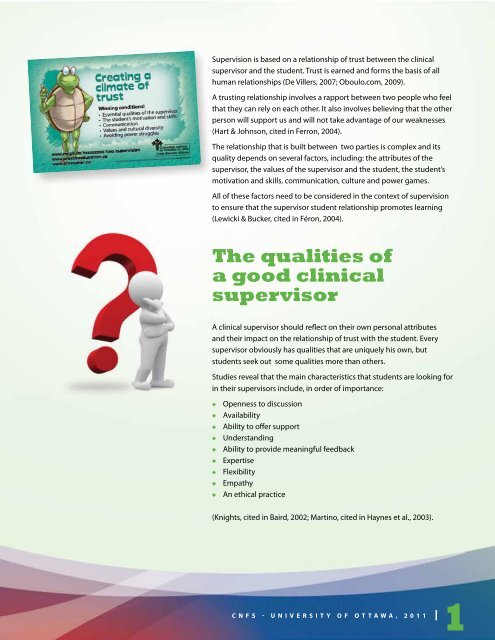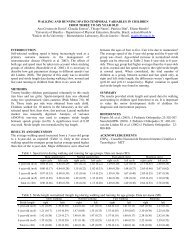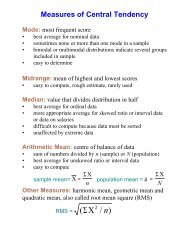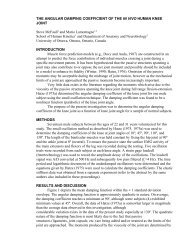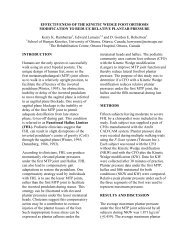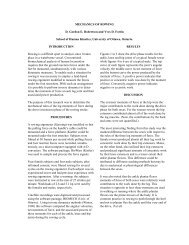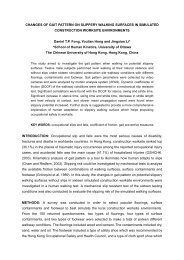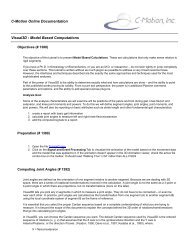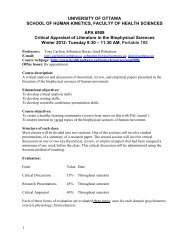Creating a climate of trust
Creating a climate of trust
Creating a climate of trust
Create successful ePaper yourself
Turn your PDF publications into a flip-book with our unique Google optimized e-Paper software.
Supervision is based on a relationship <strong>of</strong> <strong>trust</strong> between the clinical<br />
supervisor and the student. Trust is earned and forms the basis <strong>of</strong> all<br />
human relationships (De Villers, 2007; Oboulo.com, 2009).<br />
A <strong>trust</strong>ing relationship involves a rapport between two people who feel<br />
that they can rely on each other. It also involves believing that the other<br />
person will support us and will not take advantage <strong>of</strong> our weaknesses<br />
(Hart & Johnson, cited in Ferron, 2004).<br />
The relationship that is built between two parties is complex and its<br />
quality depends on several factors, including: the attributes <strong>of</strong> the<br />
supervisor, the values <strong>of</strong> the supervisor and the student, the student’s<br />
motivation and skills, communication, culture and power games.<br />
All <strong>of</strong> these factors need to be considered in the context <strong>of</strong> supervision<br />
to ensure that the supervisor student relationship promotes learning<br />
(Lewicki & Bucker, cited in Féron, 2004).<br />
The qualities <strong>of</strong><br />
a good clinical<br />
supervisor<br />
A clinical supervisor should reflect on their own personal attributes<br />
and their impact on the relationship <strong>of</strong> <strong>trust</strong> with the student. Every<br />
supervisor obviously has qualities that are uniquely his own, but<br />
students seek out some qualities more than others.<br />
Studies reveal that the main characteristics that students are looking for<br />
in their supervisors include, in order <strong>of</strong> importance:<br />
Openness to discussion<br />
Availability<br />
Ability to <strong>of</strong>fer support<br />
Understanding<br />
Ability to provide meaningful feedback<br />
Expertise<br />
Flexibility<br />
Empathy<br />
An ethical practice<br />
(Knights, cited in Baird, 2002; Martino, cited in Haynes et al., 2003).<br />
C N F S - U n i v e r s i t y o f O t t a w a , 2 0 1 1 |1
Haynes et al. (2003) also reported the ten “faults” that, in the opinion <strong>of</strong> students, have a<br />
negative impact on the quality <strong>of</strong> clinical supervision. In order <strong>of</strong> importance, they are:<br />
Lack <strong>of</strong> interest<br />
Lack <strong>of</strong> availability<br />
Rigid approach<br />
Lack <strong>of</strong> knowledge and experience<br />
Lack <strong>of</strong> reliability<br />
Irregular feedback<br />
Overly critical approach<br />
Lack <strong>of</strong> empathy<br />
Lack <strong>of</strong> organization (no structure)<br />
Lack <strong>of</strong> pr<strong>of</strong>essional ethics<br />
Power games<br />
Crèvecoeur (2000, p. 19) stated that power games seem to be everywhere in our lives and that<br />
is why it is so difficult to avoid them.<br />
A power game is behaviour by which you make someone do something you want them to<br />
do (Crèvecoeur, 2000). In other words, it is psychological pressure applied by one person on<br />
another but unconsciously. The pressure translates into a feeling <strong>of</strong> uneasiness by the person<br />
who “is submitted to” the pressure. In this case, the supervisor no longer feels free to give the<br />
student instructions or to express dissatisfaction to the student.<br />
Here are a few ways this pressure can be applied:<br />
Flattery: used so that the person is in a good mood and agrees to do or to think what we<br />
want. e.g.: “You really are the best supervisor!”<br />
Pity: increases the pressure associated with the request by ramping up the consequences.<br />
We want the person to feel guilty if he refuses to help us. e.g.: “I am beginning to worry that I<br />
will not get finished in time!”<br />
Self deprecation: we want the person to take pity on us and help us. e.g.: “I am so stupid!”<br />
Playing the victim: we want the other person to get involved in our problem; we force them<br />
to help us. e.g.: “I am going to fail if you do not help me. . .”<br />
Emotional blackmail: we want the other person to feel responsible and to intervene on our<br />
behalf. e.g.: “The poor patient will not get good care if I am the one giving it.”<br />
Involving the other person in our problem: in this case, we force the other person to find a<br />
solution to our problem. e.g.: “What could we do?”<br />
C N F S - U n i v e r s i t y o f O t t a w a , 2 0 1 1 |2
Important clarification<br />
Power games cannot be played unless there are two parties involved.<br />
Repetition (or exaggeration) <strong>of</strong> the behaviour is a reliable indication that a power game is being<br />
played.<br />
Why are power games played in the<br />
context <strong>of</strong> supervision?<br />
Why would a supervisor or a student need to play power games, consciously or unconsciously?<br />
The supervisor and the student may resort to a power game because they:<br />
Need approval: The supervisor lacks self-confidence and is seeking the student’s approval.<br />
The student needs reassurance, to hear that he is competent.<br />
Have a strong need to be liked: The supervisor does not want to give negative feedback to the<br />
student for fear that the student will no longer like him. The supervisor may be tempted to set<br />
aside his authority in order to act as a friend or colleague.<br />
The student wants to be told he is appreciated. He attempts to redefine the purpose <strong>of</strong> the<br />
supervision by changing the supervision relationship. He tries, consciously or not, to make the<br />
relationship into a friendship or to “steer” the relationship.<br />
Feel threatened: The supervisor may feel threatened by a student who is highly skilled. The<br />
supervisor may also feel that the student is pushing him to change his “old” ways <strong>of</strong> doing<br />
things.<br />
The student does not enjoy being in a subordinate position. He feels that his independence is<br />
threatened. He therefore tries to show his “superiority” by referring to recent theories, making<br />
himself feel like he is controlling the situation.<br />
C N F S - U n i v e r s i t y o f O t t a w a , 2 0 1 1 |3
The supervisor may also be tempted to play a power game if he:<br />
Does not like using his authority: The supervisor is not used to assuming an authority figure<br />
role and may not be comfortable in that role.<br />
And the student may also play power games to:<br />
Cut his losses to a minimum: By shifting the attention, the supervisor becomes less<br />
demanding. The student tries to control the situation in order to be successful in his clinical<br />
placement by:<br />
- asking the supervisor all the questions<br />
- acknowledging all his mistakes<br />
- always asking “What would you do in my place”<br />
- demonstrating resentful obedience, being argumentative, reporting only<br />
insignificant things<br />
How to stop power games?<br />
The first step is to search your own conscience: analyse your own behaviour as a supervisor.<br />
Then, take the time to carefully observe and analyse the student’s conduct. Is it really a<br />
power game?<br />
Try to understand why as a supervisor you would get involved in the game (e.g. lack <strong>of</strong> self<br />
confidence? fear <strong>of</strong> being judged? fear <strong>of</strong> disappointing someone?). Ask yourself why the<br />
student is acting as he is. Try to identify theunderlying motivation for his behaviour.<br />
Do not let yourself be manipulated: The most important thing is to stop contributing to the<br />
game. The power game will only stop if the supervisor “refuses to play”.<br />
The following sites <strong>of</strong>fer other useful information about the qualities <strong>of</strong> a supervisor,<br />
motivation and skills, the principles <strong>of</strong> learning, communication, cultural diversity, and<br />
power games: www.mcgill.ca/hssaccess/two/supervision, www.practiceeducation.ca and<br />
www.preceptor.ca.<br />
© 2011, Consortium national de formation en santé (CNFS) – University <strong>of</strong> Ottawa. All rights reserved.<br />
C N F S - U n i v e r s i t y o f O t t a w a , 2 0 1 1 |4


